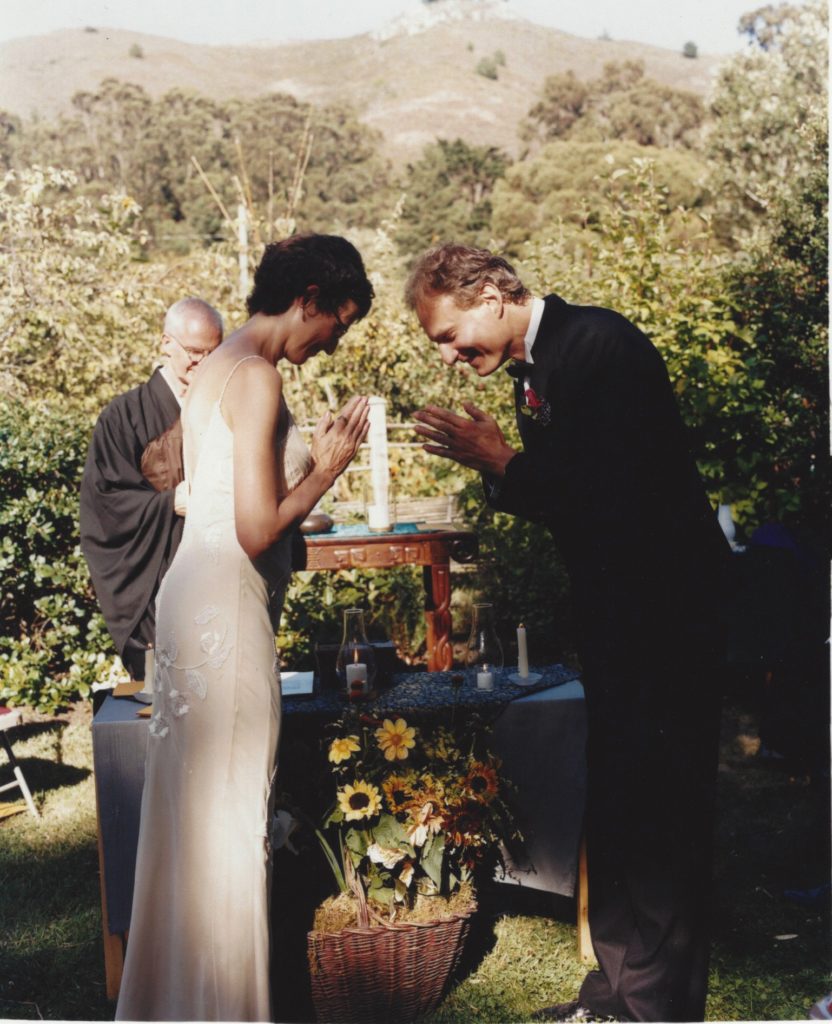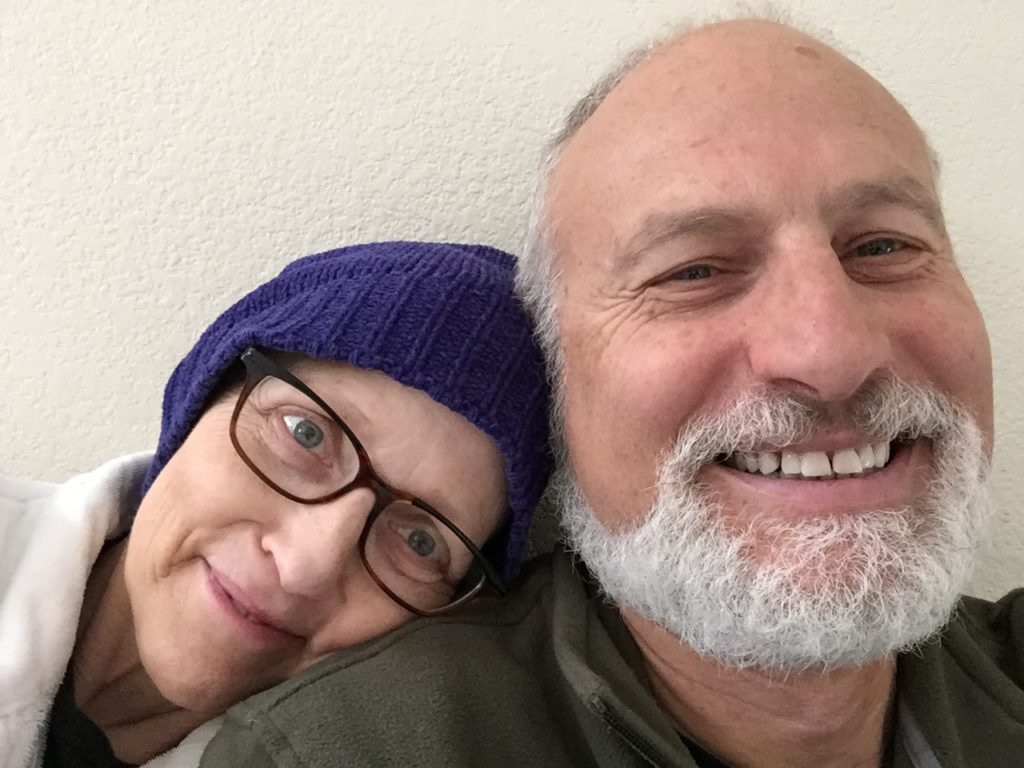
Our Wedding Aug. 15, 2003
When I first met Tracy Seeley I couldn’t look into her eyes. They were so beautiful I felt like I couldn’t look into them without falling. I was embarrassed. They made me feel exposed, naked, like I was staring at something illicit. So I looked away. Nervously.
(Please take a look at the photo below, taken about a month before she died. If those aren’t the kindest, most loving and compassionate eyes you’ve ever seen then consider yourself extremely lucky.)
On about our 4th date I stopped her suddenly on the street. “You’re not neurotic at all are you?” I don’t remember her reaction now but I imagine she laughed slightly. Freud invented psychoanalysis for people like me with my background. Educated European Jews. I was a bit stunned to actually meet someone who didn’t seem to fit the patterns of neurosis that I seemed to find in pretty much every other person I encountered. “Well, this is refreshing!”
As I later learned Tracy of course had her own issues. She could be very controlling. Everyone has her or his shadows; there is no escaping that. In recognizing hers I guess you could say I graduated from Freud to Jung. She once told me, without irony, that if I just did what she said I wouldn’t be so miserable.
She knew who she was to her deepest core – a mother and an English professor. She didn’t moan or fret about what she was on the planet to do. She just did it, everyday, with confidence and the complete congruence that comes with self-knowing. Founding USF’s “Writing Warriors” was a logical outgrowth of her own disciplined need to set aside time to write. Founding USF’s Center for Teaching Excellence was an organic offshoot of her own commitment to be the best teacher to her students she could possibly be. It was a joy to see her discover yet another talent. To complement her superb academic writing she learned she was a brilliant creative writer. If you haven’t yet read her memoir/essay My Ruby Slippers run and get it now. You can come to know Tracy the best way possible – through her art. It’s what I’m doing again, reading it now to keep her close.
She was the single most mature human being I’ve ever met. Her acceptance of all life’s misfortunes was deep. Perhaps it dated back to her initial diagnosis of cancer in 2002. But I suspect it went further. On days when I wanted to put my fist through walls, defeated by my absolute impotence to help her, days when she would puke five times trying to keep food down that first chemo and later opiates would not allow her, she would emerge from the bathroom with a slight smile on her face – genuine – and say, “Dying is really hard for a control freak.”
Her delight in the simplest things amazed me. Though we both could vie for All-Time Cheapest Date Awards, she did not possess a closet drama queen, a recovering narcissist, needing spotlights to bask in and chandeliers above crystal pools to find her reflection in. In her final months, no doubt partly to grope back to full consciousness and repossess the vast intelligence which was her birthright – reclaiming it from the chemo and the drugs – she spent hours watching cute kid and animal videos, the kind where birds bathe in a dog’s water bowl. This was Majestic Life too and she laughed and cried and relished it all. We would laugh together and remember Miriam Engelberg, Tracy’s close friend from her first cancer support group, (dead at 48, leaving a 10 year old child), who wrote the absolutely true graphic novel “Cancer Made Me a Shallower Person.”
A deep sense of mortality is what brought us together. When we met she had recently completed her first year of living with cancer – surgery, radiation, chemo… the whole cocktail. I was neurotically obsessed with dying from Type I insulin-dependent diabetes since I’d recently failed my last ditch alternative approach. Likely one of us would die soon, certainly within ten years, so we knew time was short. We certainly had many good laughs, even after her Stage IV diagnosis in 2006, that the joke was going to be on us and that we’d actually live together into our 80s.
Ever the proper Kansas girl she would always thank me when I complemented her. On her clothes, her beauty, her talent… it didn’t matter. Sometimes it felt like a mannered reflex but most of the time I could tell she really meant it. That it was somehow not her due, not a simple recognition of what is, something natural in the course of things, but a fulfillment, like a chord of music that otherwise might leave a melody unresolved. It was an ever-resonant expression of her endless gratitude.
Her natural state was buoyant. She was happy much of the time. She would often sing around the house. A visitor to our home in her last weeks commented how she seemed joyful. “I can see it in your eyes,” he said. She knew what was coming and she was at peace.
She was never happier when in bed with a good book. Her capacity for joy and meaning found in reading was boundless. I fall asleep in 4 to 5 pages. She could literally read all day. She rightly sensed I had little to no experience with people like her. Quiet: The Power of Introverts in a World That Can’t Stop Talking suddenly appeared in our house. When she finished the book she threw it on the bed near me and said “Read this.” That’s what an impassioned cry from an introvert looks like. It helped. At least I stopped wondering if she was somehow hiding from the world, retreating behind vast readings.
One of my great sadnesses of her last few months was seeing her in bed not reading. That more than anything told me the end was near. I took to reading to her. A friend gave her Dwellings by Linda Hogan – a book seemingly designed to read to the dying. It was quite the scene. I had to stop reading due to the tears that kept choking me. Every sentence a hymn to all that is noble and true on this fragile, precious planet. Tracy drifted in and out of consciousness while listening. What she heard she told me she loved. If ever there were a book perfectly fashioned to intermingle with dream-states, this is it.
In those last months I would rake the coals of my brain to think ‘What can I do now to make her life richer, more meaningful?’ I thought, Beethoven symphonies? Pre-Raphaelite paintings? Rumi’s poetry? Only in her last days did I finally relax and remember she’s always been unpretentious, treasuring what’s simplest and right in front of her.
She surprised me about a month before dying by expressing some career regrets. She certainly had hoped to finish another work of creative non-fiction, based on her extended family’s history and their intersection with seminal world events – the WWI U.S. flu pandemic which affected 28% of the U.S. population and killed her grandfather, and the Irish potato famine which brought many of her ancestors to North America. But the truth was that she was too devoted to living life, to savoring all its fullness to be bothered with career achievements.
She acquired new skills simply for the delight she found in learning them. She bought a guitar and taught herself to play quite well. She bought a piano and resurrected smiles in playing not experienced since adolescence. She had long mastered all the “domestic arts,” only giving up things like cooking when she lost interest. When she fixed cellphones, installed shelves, reupholstered chairs, and rewired lamps I told her how glad I was that there was a man around the house. Her greatest joy in her last months was sewing a quilt for her as yet unborn grandson. When she realized she couldn’t finish the quilt herself she took it to a local store. After they told her the date they expected to finish it for her she told them she was dying and couldn’t wait that long. These lovely women, so-called strangers, held her while she cried. They finished that quilt in short order and proudly delivered it to her own living hands. Not wanting to leave a single possession ungifted, Tracy left notes, gifts and cards all over the house so that everything she loved could find its way to someone she loved.
How rare is it these days to meet someone who’s not an addict? Work, sex, drugs, alcohol, sleep, food… everybody’s got something. Not Tracy. Her soul was grounded deep in Kansas soil. Part of why we moved from San Francisco to Oakland was so she could garden. The house we lived in for three years had a small but sumptuous back yard – flowering bushes, a plum tree… Tracy put in her own vegetable garden and dreamed of having chickens. Farm City, the book by our almost neighbor Novella Carpenter, inspired her deeply. One day she came skipping into the house shouting “You won’t believe what the tomatoes are doing!”
To support her in dying was one of the great gifts of my lifetime, perfectly bookending and healing for me the shocking, instantaneous, but hidden-from-view loss of my 41-year-old father from a heart attack when I was 9. We talked about so many important and meaningful things but I don’t recall ever telling her what a gift it was for me to walk her last mile by her side.
All of us are graced with this thing called Life. We are blessed to have it, double blessed to know we have it. We are all called in our own ways to fulfill the mandate that life has bestowed upon us – to become the greatest, most complete versions of ourselves possible, and to give those gifts that are uniquely ours as freely and widely as possible. Tracy lived this notion with her students, doing everything she could to awaken them to their own greatness. Cards and letters from them testifying to the seminal life transformations they experienced in her classes, some dating back 20 years, still arrive every day.
It’s hard to make a case that any one person is somehow endowed with a greater portion of life force but Tracy possibly was. Certainly once her mother died in her mid-60s from her own cancer Tracy knew her life would be short. Though our marriage wasn’t perfect I did everything I could to pour every ounce of love and devotion into her that was possible. I took to stroking her bald head in her last days when even light pressure on her limbs became painful. On her last night, after giving her her meds, I was stroking her head telling her how beautiful she was and how I loved her so. Her last words to me were whispered. “Thank you.”
Tracy Seeley: April 6, 1957 – July 7, 2016

